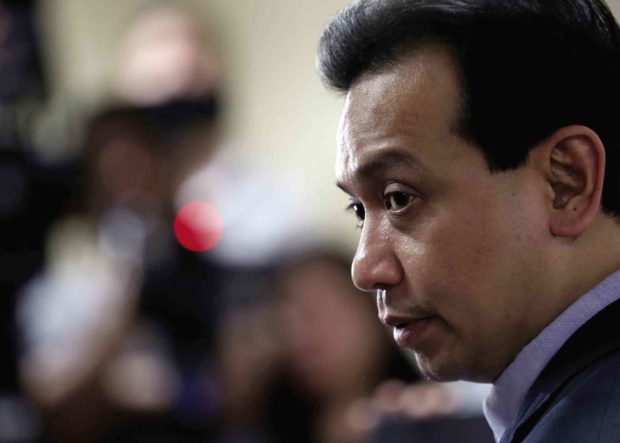
Sen. Antonio Trillanes IV (File photo by RICHARD A. REYES / Philippine Daily Inquirer)
The Department of Justice ( DOJ) on Wednesday opposed the request of Sen. Antonio Trillanes IV to travel to Europe and the United States.
In its seven-page opposition submitted to Makati City Regional Trial Court Branch 150, DOJ prosecutors said Trillanes should not be allowed to travel because he was a “flight risk” with several cases filed against him, among them a coup d’etat at Makati RTC Branch 148 and a rebellion case at Makati RTC Branch 150.
He also faces complaints of sedition and proposal to commit coup d’etat and grave threats at the Pasay Prosecutor’s Office and two libel complaints filed by Paolo Duterte at the Davao Prosecutor’s Office.
“Allowing the accused to travel at this time allows for the possibility that in case a warrant of arrest is issued against the accused, he will already be beyond the jurisdiction of our courts and thereby easily evade arrest,” the DOJ said.
Earlier, Trillanes filed a petition to be allowed to travel at Makati RTC Branch 150, which is presided by Judge Elmo Alameda, who had earlier issued an arrest warrant and a hold departure against him due to his rebellion case.
He planned to go abroad on invitations to attend several activities:
- from Dec. 11, 2018 to Jan. 11, 2019 to Amsterdam in The Netherland, Barcelona in Spain, and London in England
- from Jan. 27 to Feb. 10, 2019, in California, Washington. D.C., and Maryland in the US
READ: Trillanes seeks Makati court’s nod to travel to Europe, US
According to the DOJ, its opposition to Trillanes’ motion “does not violate the interdepartmental courtesy and principle of comity between Senate and judiciary department.”
This indicates that the travel authority granted to him by Senate President Vicente Sotto III “is by reason of him being a senator,” but the hold departure order is by reason of him being an accused.
The DOJ said it upholds the constitutional principle of separation of powers, noting that each department of the government has “exclusive cognizance of matters” within its jurisdiction.
It insisted, however, that Trillanes had no right to travel, as he had posted bail on his rebellion case. This, the DOJ said, meant that the court had the right to prohibit him from traveling abroad.
Trillanes posted bail at Makati RTC Branch 150 in relation to his rebellion case arising from the Manila Peninsula siege in 2007.
This condition on his bail, the DOJ argued, imposed that Trillanes should “make himself available at all times whenever the court requires his presence.”
Moreover, DOJ said “there is no compelling reason” to allow Trillanes to travel as the lecture series that Trillanes would attend was “not urgent.”
It also advised Trillanes to use modern technology to sent his inputs through e-mail and communicate with government officials who would attend the events abroad. /atm